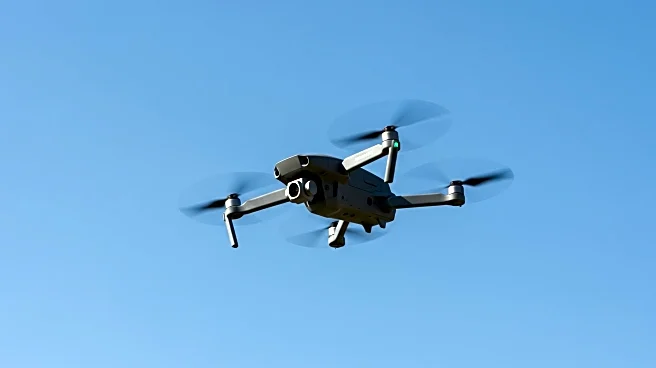What is the story about?
What's Happening?
Marut Drones, a drone manufacturing and training company, has received DGCA type certification for its Skyswift 56 surveillance drone. This quadcopter-class rotorcraft is designed for surveillance, mapping, and training purposes, supporting various payload configurations such as FPV cameras, mapping cameras, and thermal imaging. The drone is intended for use in law enforcement, reconnaissance, patrolling, and public safety operations. Developed in-house, the Skyswift 56 is portable, weather-resistant, and can be deployed quickly in field operations.
Why It's Important?
The certification of Skyswift 56 marks a significant advancement in drone technology, particularly in the realm of surveillance and public safety. As the drone market in India grows, with projections of reaching ₹54 billion by 2030, innovations like the Skyswift 56 can enhance operational efficiency in various sectors. The drone's capabilities in law enforcement and public safety could lead to improved security measures and faster response times in critical situations. Additionally, the development of such technology supports the growth of the drone industry, potentially creating new job opportunities and economic benefits.
What's Next?
With the certification in place, Marut Drones may focus on expanding its market presence and increasing production to meet demand. The company might also invest in training programs to address the shortage of trained drone pilots, ensuring effective deployment of the Skyswift 56. As the drone industry continues to evolve, Marut Drones could explore partnerships with law enforcement agencies and other sectors to integrate their technology into existing systems, enhancing surveillance and safety operations.
Beyond the Headlines
The development and certification of the Skyswift 56 could raise discussions on privacy and ethical considerations surrounding surveillance technology. As drones become more prevalent in public safety operations, there may be increased scrutiny on how data is collected and used, necessitating clear regulations and guidelines. Furthermore, the advancement of drone technology could lead to broader applications beyond surveillance, such as environmental monitoring and disaster response, showcasing the versatility and potential impact of drones in various fields.















